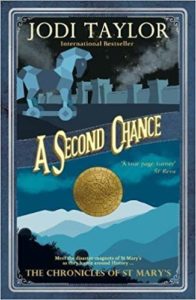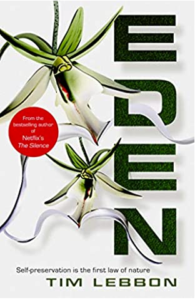Ahhhh, so lovely to slip back into the genre-bending fantasy-cyberpunk world of The Founders Trilogy, like a nice warm bath for my mind. The first novel Foundryside was one of my favorite books of 2018, and I was ecstatic to be able to get my hands on an advance copy of the sequel, which begins about three years after the events of the first book end. Sancia, Berenice, Gregor and Orso have radically altered the power structure of Tevanne by opening their own scriving house in what’s now known as the Lamplands, inspiring  numerous others to break away from the sprawling campos of the three remaining large houses in order to found their own small enterprises. That isn’t enough for our Foundrysiders tho, who have been working on ways to topple the large houses and their dependence on slavery for good.
numerous others to break away from the sprawling campos of the three remaining large houses in order to found their own small enterprises. That isn’t enough for our Foundrysiders tho, who have been working on ways to topple the large houses and their dependence on slavery for good.
Shorefall opens with a heist, as the Foundrysiders infiltrate the Michiel complex in order to steal all their scrivings (basically, all their patents/programming.) But a nocturnal visitor warns Sancia that something terrible is on its way, that Dandolo House has done the unthinkable and resurrected the First Heirophant himself. As the mad heirophant Crasedes draws closer to Tevanne, Sancia and crew must find a way to contain him, but soon find themselves pawns in a struggle spanning centuries, a struggle not all of them will survive.
I feel like this novel had a bit of second book syndrome, where the author had to cram in all the between bits before being able to turn his gaze to the finale. Which doesn’t make it a bad book at all, but I certainly felt less invested in the proceedings and more hurried along than I had in Foundryside. To a certain extent, the breathless nature of Shorefall’s narrative was the necessary result of certain plot twists, but the rapid exposition thereof lent the reader little time to empathize with our characters. I was also pretty mad about what happened to Orso. Like, I get it, but I certainly don’t have to like it.
I did like that we find out more about Crasedes and Clef and their relationship, tho again, if the narrative hadn’t felt so hurried, I would likely have felt it more deeply at the big reveal. I’m guessing that Valeria is Clef’s wife and Crasedes’ mom? I imagine that will be explained in the sequel. And while I absolutely prefer the idea of radical empathy as a solution to the age-old problem of “how to stop people from abusing power”, especially in contrast to Valeria and Crasedes’ differing but equally terrible solutions, I found myself instinctively recoiling from the mindmeld technique as I’m not convinced that it will preserve autonomy or necessarily promote goodness and humanity. The Foundrysiders could do it because they’re all good people, but what if, say, the Morsinis had discovered this and used it to convince the powerless that whatever benefited the Morsinis was the only thing that mattered? I’m hoping this is another thing addressed in the last book, which I am no less looking forward to despite Shorefall not being quite as spectacular as Foundryside. It’s still a solid read and an entertaining novel, and sets the stage for a brand new world in the trilogy’s final installment.









